
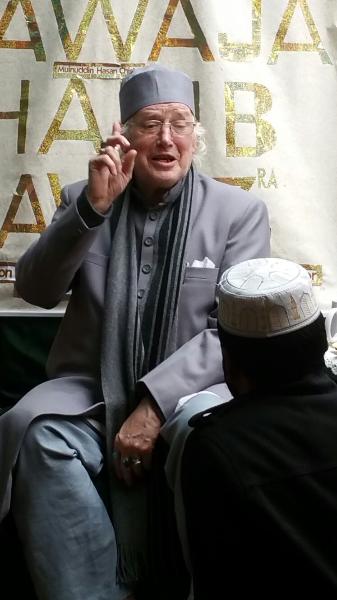
Speech for Khwaja Saheb 'Urs 17. Written and presented by
Jamiluddin Morris Zahuri
Aozoo Billa Hi Minach Shatwan nir Rajim
Al- Humdo
Thanks belong to Allah the All-mighty, for the gift to mankind of his beloved Prophet
Muhammed.
Brothers, Sisters, Friends, welcome to the Urs of Khwaja Muinuddin Hasan Chishti.
Our niyat, intention, today is to celebrate the Urs, the death anniversary of Khawaja
Gharib Nawaz, Hazrat Muinuddin Hasan Chishti. To praise Allah for his life and his
immense contribution to the spiritual welfare of mankind. ‘Urs is a wedding ceremony
when the one whom Allah loves is united with him as a bride and groom are united in a
wedding.
Let us begin with a recitation of the predecessors of Khwaja Muinuddin Chishti.
First the holy Prophet Muhammed (SAW)
The head of the Khwaja Kwajagan Hazrat Ali Murtaza bin Abi Talib
Hazrat Khwaja Hasan Basri
Hazrat Abdul Wahid bin Zaid
Hazrat Fuzail bin Ayaz
Hazrat Ibrahim bin Adhem
Hazrat Sadreeduddin Tul Marashee
Hazrat Aminuddin Hubera
Hazrat Mumshad Alu Denoori
Hazrat Abu Ishaq Shami Chishti
Hazrat Abu Ahmed Chishti
Hazrat Abu Mohammed Chishti
Hazrat Abu Yusuf Chishti
Hazrat Modood Chishti
Hazrat Hajji Sharif Zindani
Hazrat Khwaja Usman Haruni
Hazrat Khwaja Muinuddin Hasan Chishti
There were four successors of Khwaja Saheb
Hazrat Qutubbuddin Bakhtiar kaki
Hazrat Baba Fariduddin Gange i Shakar
Hazrat Nizamuddin Aulia
and finally
Hazrat Nasiruddin Chirag of Delhi (with him the relics of the order were buried).
Life is fragile, none of us will live forever in this life, in this world. It also passes quickly.
When we are young, perhaps just going to school, it seems this life is a long journey that
more or less goes on forever, or at least for such a long time we can’t really think about it.
When we get older we know it is not like that in a very real and present way. But as
Maulana Rumi says – “The raw grape cannot know the state of the ripe grape” and as he
might have added the ripe grape cannot know the state of being wine.
Even if you say with part of your mind – “Yes yes””, to this, only a small part of you really
accepts it. Maulana Rumi summed up his life history in three words – Hamdım, Piştim,
Yandım. I was raw, I became cooked, I became burnt.
To see what this means we will look at the life of Khwaja Gharib Nawaz whose ‘Urs or
spiritual wedding to Allah, the Essence, we celebrate over these holy days of Rajab. We
do this to try to be in the goodly company of those with whom Allah is well-pleased. I
mean his Prophets and His Saints and His friends. Those whose very soul and essence
has united with Him. Those who served Him as He Wished and who thus served all-
mankind ....and here is the important point, who continue to serve Mankind and thus to
serve Him.
The essence of the Sufi Way is found in the prophets and in the Saints. The Prophets
and saints continue to live beyond the veil that stops us seeing them. This is beyond
rational proof, but also beyond doubt for those who follow the Way.
Most people after death receive their sawab, their reward for their good deeds, if they
have any, in this life. Saints such as Shah Wali Ullah of Delhi tell us that they then sleep
till the Day of Judgement.
The Prophets and saints, however, have committed their lives to the love of Allah. Thus
when their own sawab is exhausted that Love becomes the means by which Allah
continues to keep them alive in the unseen. From there they act upon this visible world.
Thus it is that Khwaja Gharib Nawaz, Khwaja Muinuddin Hasan Chishti, known as Sultan
ul Hind, continues after so many years to play his untiring active role in the welfare of
mankind. Thus it is that Khwaja Abdul Qadir al-Jillani (RA) continues to play his important
role in the life of this world. Thus it is that Khwaja Jalaluddin Rumi (RA) does the same in
Turkey. Many other saints, under the shelter of these great ones, also play their part in
the continuing management and unfolding of Allah’s Universe.
Khwaja Gharib Nawaz, as he became known, was born in Isfahan and grew up in nearby
Sanjar in modern day Iran. His father Ghyasuddin, was a pious man of high spiritual
standing. He died when Khwaja Saheb was only 14 years old, leaving him an orphan
with a grinding stone and a garden as inheritance. It so happened that a wandering
mystic known as Ibrahim Qandoozi came to that garden. Khwaja Saheb treated him so
hospitably the mystic was pleased with him. He took a thing he had chewed in his own
mouth and gave it into the mouth of Khwaja Saheb. The effect was extra-ordinary, in one
moment Khwaja Saheb lost all interest in this passing life. He wanted to know the Gospel
of Truth. He wanted to know about Eternal Life. He sold his grinding stone and his
garden and gave the proceeds to the poor. He set off on the quest of a lifetime – a quest
that was to prove so successful that to this day we speak of it, so many years later, and
apparently so very far away.
At first his searching was quite academic – he had already learnt the holy Qur’an, the
Hadiths, and the Tafsir, the commentaries; but to begin with he deepened his studies in
Khorosan, Samaqand and in Bokhara with learned men such as Maulana Hussamuddin
of Bokhara. He travelled to various places in pursuit of higher knowledge. He is said he
met Ghauth Pak to whom he was related. Ghauth Pak predicted he would become the
source of attraction for myriads of people. At last reached Haroon in modern day Iran
and there he became a murid of Khwaja Uthman Harooni and spent two and a half years
in asceticism to purify his lower nature. He was appointed as successor and allowed to
take disciples.
After this he went on his travels and visited many important Sufi places and met many
mystics. These places include Baghdad,, Kirman, Tabriz, Astrabad, Khirqan where he got
inspiration from the tomb of Abul Hasan Kharqani. He also visited the tomb of Hazrat Abu
Said Abil Khair of Memna (Afghanistan) – where he stayed for two years. In Herat he
stayed in the tomb of Sheikh Abdullah Ansari. He visited India for the first time – first he
stayed at Multan then Lahore where he spent two weeks at the shrine of Pir Ali Hujwiri –
Data Ganj Baksh. From there he reached back to Baghdad where he became for a
second time initiated by Khwaja Uthman Harooni.
Let us hear from Khwaja Saheb himself;
I, Moinuddin Hasan of Sanjar - well wisher of all the faithful, had the honour of meeting
Hazrat Khawaja Uthman Harooni in the mosque of Khawaja Junaid of Baghdad (ra). His
holiness was surrounded by inspired Dervishes…….(he).. asked me to offer two
genuflexions…Then he asked me to sit with my face towards Kaaba– he asked me to
recite sura Baqara – which I did.
Further he commanded me to recite benedictions on the holy Prophet Muhammed
(pbhu). I obeyed. Khawaja Uthman Harooni stood up and holding my hand lifted his face
towards the sky and said --‘Come let me cause thee to reach Allah.’
After placing the four edged cap and bestowing a robe on Khawaja Saheb they sat down.
There followed a day and night of asceticism.
Khawaja Saheb continues.
‘The next day, when I attended upon him he asked me to sit down and recite Sura Ikhlas
4000 times. I did. He asked me to look towards the sky. I did.
He asked me ‘How far do you see’. I replied ‘up to the Great Throne’. Next he asked me
to look towards the ground. I did.
He asked me, ‘How far do you see?’ ‘I replied – to the furthest reaches of the earth’ .
Next he asked me to recite Sura Ikhlas again a thousand times. I did.
He asked me to look towards the sky again. I did.
He asked me ‘How far do you see now? I replied, ‘Up to the Great Hidden’.
Next he asked me to close my eyes. I did. He asked me to open my eyes. I did.
Next, showing me two fingers, he asked me what I saw there. I replied 18000 worlds.’
After that Khawaja Saheb was instructed to look under a certain brick where he found
some dinars. He was instructed to distribute them amongst the poor.
Later the following account is given of events in Mecca on pilgrimage.
Khawaja Saheb says:
‘After going round the Kaaba Khawaja Uthman Harooni took my hand and entrusted me
to Allah. He prayed in Kaaba for my humble self. A voice was heard - ‘We have
accepted Moinuddin’.
On reaching Medina they presented themselves at the court of the holy Prophet (pbuh).
Khawaja Saheb was instructed to offer his reverential salaams. A voice came out saying
‘Peace be on you also, O head of the Pious of the Earth and the Sea.’
On hearing this Khawaja Uthman said - ‘Now, indeed, you have reached perfection’.
One day when Khawaja Saheb was absorbed in prayer in Kaaba he heard a voice
saying:
‘ O Moinuddin! We are greatly pleased with thee. Thou art given salvation. Ask for
anything thou may like so that We may grant it to thee.’
Khawaja Saheb prayed not for himself but for the salvation for his followers and disciples
and the reply came:
‘O Moinuddin thou art our accepted one. I will give salvation to thy followers and
disciples, and also to those who may enter thy fold till the Day of Resurrection.’
After reaching Medina he received from the holy Prophet (pbuh) in the Quba Mosque, a
mandate to the effect that:
‘O Moinuddin! Thou art a helper of my religion. I entrust to thee the country of
Hindusthan. There prevails darkness. Proceed on to Ajmer and spread there the gospel
of Truth’.
Khawaja Saheb became drowsy and was blessed with seeing in vision, the city of Ajmer.
He was bidden farewell and given the gift of a pomegranate from heaven.
Now he began that mission which was to consume the rest of his life. To bring the gospel
of Truth to the dark divided continent of India by divine command.
He made Qutub Saheb his successor though Qutub Saheb was only 17 years old. This
came after a dream which he had for forty nights. In that dream the holy Prophet
appeared and told Khwaja Saheb to do this. Eventually, Allah himself appeared and said
to make Qutub Saheb the successor. Accordingly in Baghdad that actually happened.
Khwaja Saheb also made a prophecy whilst in Baghdad, that Sultan Il Tut Mish, who was
then 12 years old, would become Emperor of India. This actually happened and he was
to become Khwaja Saheb’s disciple too.
Now he made his way towards India. At a certain place in Afghanistan he encountered
the ruler of that place. Khwaja Saheb had made ablutions and offered Namaz in a garden
belonging to that ruler who was called Yadgar Mohammed. When that ruler entered the
garden he asked his servants why that man, Khwaja Saheb, had not been moved.
Khwaja Saheb lifted his head and looked at Yadgar Mohammed, who fell down in a faint.
He and his disciples became followers of Khwaja Saheb. Leaving behind property and
wealth they followed Khwaja Saheb until finding that man purified Khwaja Saheb left him
the domain of Shadman Fort.
He continued his journey to Delhi via Lahore and then to Ajmir in 1191 AD.
His first stay in Ajmer saw an encounter with the local ruler. Despite the famous miracle
of the camels Khwaja Saheb was asked to leave by the ruler. He left, following the divine
mandate to Serve God and His apostle but to obey the ruler. He warned however that
Shabuddin Ghori would be coming to turn out that ruler. That actually happened and the
second time he reached Ajmer and was told to leave, in fact within three days it was the
ruler who had to leave as Shabuddin had arrived with his army.
Khwaja Saheb made other travels after this, both to Balkh and possibly Khorosan. He
also travelled to Delhi on occasions which his successor, Qutub Saheb, had made his
headquarters. On one such occasion Khwaja Saheb asked Qutub Saheb if he had any
persons who merited their joint blessing. Together they visited Baba Farid who was so
weak from his austerity he was unable to stand. Together the Saints lifted him up and
Khwaja Saheb prayed for him to be accepted as a perfect dervish. A voice was heard
accepting him and announcing him to be a great dervish of his time. They each gave him
some articles such as a robe and a turban. Khwaja Saheb remarked to Qutub Saheb –
“You have indeed brought a big hawk in your net. His nest will be in highest heaven”.
Now Khwaja Uthman Harooni visited Delhi. Khwaja Saheb himself mention that he had
served Khwaja Uthman for twenty two years. He and Khwaja Qutub Saheb found a quiet
place for him to stay in Delhi. Whilst there the Sultan, Il-Tut Mish, came to meet him and
begged to become a murid. In response to the request of his guide Khwaja Saheb wrote
a book to be called Gange- ul-Isra. Even after Khwaja Uthman left Delhi the Sultan spent
time in Khwaja Saheb’s company whilst absorbed in the study of his book. He gained the
rank of saint.
After this Khwaja Saheb left Delhi and settled permanently in Ajmer.
Eventually when his time came and his work in this mortal body was complete and the
message of the overpowering importance of Love of Allah was established as a doctrine
that should be available to all whatever their background or religion, he was finally united
with his Beloved forever.
I will give you the description written in the book of my own Shaikh Dr Zahurul Hasan
Sharib.
On Monday the 6th of Rajab 627 AH – the 21st May 1229 Gharib Nawaz after night
prayers went into his room and closed the door. He did not permit anyone to enter in. All
night long the people outside heard a mystic sound coming from the room....
At the approach of dawn the sound was not to be heard. When the door remained closed
at the time of the morning prayers his devotees thought there was something unusual.
In short, when the door was opened they found him dead and on his forehead was
written these words:
Haza habeeb Allahi
Mata fii hub Allahi
'He was a beloved of Allah, He died in the love of Allah'.
That night in dream some saints saw the holy Prophet Muhammed saying: "Moinuddin is
a friend of Allah. Today I have come to welcome him".
Qutub Saheb his successor wrote this:
‘.. I felt a little drowsy whilst sitting on my prayer carpet. I saw that he (Gharib Nawaz)
was standing underneath the throne of God. I put my head upon his feet and inquired
his condition. He replied: ‘God has been merciful enough to shower His blessings upon
me. He has allotted me a place near the angels and thus underneath His Throne. I live
here’.
So this is the meaning of Hamdım, Piştim, Yandım. I was raw, I became cooked and then
I was burnt. Here was one of God’s created ones who attained and was granted by The
All-mighty not only spiritual powers but the ability and right to govern as an Emperor the
whole dark continent of India. Does he live still? Oh yes, and in a way some can imagine
but few really get to see.
One can say that were it not for his constant intervention that continent would be such a
mess we cannot imagine. Did he bring Islam to India – he did, but so much more too. He
taught the doctrine of Ishq, Divine Love. That people of differing backgrounds and faiths
could approach him and be benefitted spiritually by him. That people who were full of sin
could come and be forgiven. That the lost could find God, the Divine Beloved; Allah. That
the seeker could be united with the Sought. The pious found in him piety; the ascetic,
asceticism; the lover – the Beloved.
Brothers do not sit on your Islam as if it was some sort of divine right. Unless you seek
something higher for yourself, a better way of living, a way of making Divine love a
reality, maybe you will be no better than the desert arabs about whom the holy Qur’an
says – they have spoken kalma with their lips but it has not yet entered their hearts.
Life is too short and eternity too long to settle for second best – aspire to follow in the
footsteps of the great Prophets and Saints.
Aspire to be like Khwaja Gharib Nawaz – and if you cannot reach his height or stature,
then at least try your best to be his friend. One who is allied with him.
Listen to some of the titles he was given.
Ata-i-Rasul, (gift of the holy Prophet)
Khwaja i Ajmer,
Khwaja i Bazurg (great Khwaja)
Hind ul Wali (Saint of India)
Gharib Nawaz (Patron of the Poor)
Sultan-ul Hind
Naib-i-Rasul-fil Hind (Deputy of the holy Prophet in India).
Other names include:
Taj-ul-Ashiqeen, Aftab –i -Jehan. Paneh-e-Bekasen (shelter of the helpless).
Here are some of his advices;
Sleep clean – for God appoints a special angel to oversee the person who sleeps like
this, one who prays for him till he awakes.
After morning prayer – sit on the prayer carpet after sunrise and the Fajr Namaz has
been completed. This person gets admission to heaven for himself – and up to 70 people
who pray with him.
He described prayer as a necessity for the development of the soul. It is the occasion
when man can confide to God his difficulties.
He described the 4 stages that the seekers have to pass through – Shariat, Tariqat,
Marifat, and Haqiqat.
With regard to charity he says – feeding the hungry puts seven veils between oneself
and hell.
He did not like false swearing – to do this brings disgrace on one’s whole household.
Gharib Nawaz did not like eating and merrymaking in a graveyeard.
He did not like that people become too involved in worldly matters. He said – the more
you are engrossed in worldly affairs the further you are from God.
He gave the following six things as a form of prayer;
1 – to see one’s own parents with respect and make salaams
2 – to see one’s children with affection
3 - to see the holy Qur’an with respect
4 - to see the face of learned men with respect
5 – to see the gate of Kaaba
6 – to see the face of one’s spiritual guide
Once Gharib Nawaz said “There is no better thing before God than prayer” Qutub Saheb
asked him what type of prayer. Khwaja Saheb said –
1 Hearing the complaint of the aggrieved – and to assist them
2 To help the needy and oppressed
3 To feed the people and free the captives
Gharib Nawaz also said – the learned men will have no learning or piety when they reach
to paradise. The Godly men and the lovers will carry with them even in heaven the mark
of Love.
Quoting the Prophet Muhammed Gharib Nawaz said;
If a bad man associates with the good he becomes good, if he associates with the bad he
becomes bad.
Gharib Nawaz said – the society of the good is better than good works and the society of
the bad is worse than bad works.
Now we must make a prayer and ask for the blessings of Khwaja Gharib Nawaz on the
people of Southampton attending his Urs.
O Khwaja Saheb in this country we do not know the full extent of material poverty and
hardship as in India and Pakistan and Bangladesh, but we do suffer from the hardships
of spiritual poverty and diseases of the heart and mind. O Khwaja Saheb make a prayer
for us to Almighty God to ease our burden and increase our Love of Him and make us
more worthy of His Love and Mercy.
Amin
Jamiluddin Morris Zahuri
Aozoo Billa Hi Minach Shatwan nir Rajim
Al- Humdo
Thanks belong to Allah the All-mighty, for the gift to mankind of his beloved Prophet
Muhammed.
Brothers, Sisters, Friends, welcome to the Urs of Khwaja Muinuddin Hasan Chishti.
Our niyat, intention, today is to celebrate the Urs, the death anniversary of Khawaja
Gharib Nawaz, Hazrat Muinuddin Hasan Chishti. To praise Allah for his life and his
immense contribution to the spiritual welfare of mankind. ‘Urs is a wedding ceremony
when the one whom Allah loves is united with him as a bride and groom are united in a
wedding.
Let us begin with a recitation of the predecessors of Khwaja Muinuddin Chishti.
First the holy Prophet Muhammed (SAW)
The head of the Khwaja Kwajagan Hazrat Ali Murtaza bin Abi Talib
Hazrat Khwaja Hasan Basri
Hazrat Abdul Wahid bin Zaid
Hazrat Fuzail bin Ayaz
Hazrat Ibrahim bin Adhem
Hazrat Sadreeduddin Tul Marashee
Hazrat Aminuddin Hubera
Hazrat Mumshad Alu Denoori
Hazrat Abu Ishaq Shami Chishti
Hazrat Abu Ahmed Chishti
Hazrat Abu Mohammed Chishti
Hazrat Abu Yusuf Chishti
Hazrat Modood Chishti
Hazrat Hajji Sharif Zindani
Hazrat Khwaja Usman Haruni
Hazrat Khwaja Muinuddin Hasan Chishti
There were four successors of Khwaja Saheb
Hazrat Qutubbuddin Bakhtiar kaki
Hazrat Baba Fariduddin Gange i Shakar
Hazrat Nizamuddin Aulia
and finally
Hazrat Nasiruddin Chirag of Delhi (with him the relics of the order were buried).
Life is fragile, none of us will live forever in this life, in this world. It also passes quickly.
When we are young, perhaps just going to school, it seems this life is a long journey that
more or less goes on forever, or at least for such a long time we can’t really think about it.
When we get older we know it is not like that in a very real and present way. But as
Maulana Rumi says – “The raw grape cannot know the state of the ripe grape” and as he
might have added the ripe grape cannot know the state of being wine.
Even if you say with part of your mind – “Yes yes””, to this, only a small part of you really
accepts it. Maulana Rumi summed up his life history in three words – Hamdım, Piştim,
Yandım. I was raw, I became cooked, I became burnt.
To see what this means we will look at the life of Khwaja Gharib Nawaz whose ‘Urs or
spiritual wedding to Allah, the Essence, we celebrate over these holy days of Rajab. We
do this to try to be in the goodly company of those with whom Allah is well-pleased. I
mean his Prophets and His Saints and His friends. Those whose very soul and essence
has united with Him. Those who served Him as He Wished and who thus served all-
mankind ....and here is the important point, who continue to serve Mankind and thus to
serve Him.
The essence of the Sufi Way is found in the prophets and in the Saints. The Prophets
and saints continue to live beyond the veil that stops us seeing them. This is beyond
rational proof, but also beyond doubt for those who follow the Way.
Most people after death receive their sawab, their reward for their good deeds, if they
have any, in this life. Saints such as Shah Wali Ullah of Delhi tell us that they then sleep
till the Day of Judgement.
The Prophets and saints, however, have committed their lives to the love of Allah. Thus
when their own sawab is exhausted that Love becomes the means by which Allah
continues to keep them alive in the unseen. From there they act upon this visible world.
Thus it is that Khwaja Gharib Nawaz, Khwaja Muinuddin Hasan Chishti, known as Sultan
ul Hind, continues after so many years to play his untiring active role in the welfare of
mankind. Thus it is that Khwaja Abdul Qadir al-Jillani (RA) continues to play his important
role in the life of this world. Thus it is that Khwaja Jalaluddin Rumi (RA) does the same in
Turkey. Many other saints, under the shelter of these great ones, also play their part in
the continuing management and unfolding of Allah’s Universe.
Khwaja Gharib Nawaz, as he became known, was born in Isfahan and grew up in nearby
Sanjar in modern day Iran. His father Ghyasuddin, was a pious man of high spiritual
standing. He died when Khwaja Saheb was only 14 years old, leaving him an orphan
with a grinding stone and a garden as inheritance. It so happened that a wandering
mystic known as Ibrahim Qandoozi came to that garden. Khwaja Saheb treated him so
hospitably the mystic was pleased with him. He took a thing he had chewed in his own
mouth and gave it into the mouth of Khwaja Saheb. The effect was extra-ordinary, in one
moment Khwaja Saheb lost all interest in this passing life. He wanted to know the Gospel
of Truth. He wanted to know about Eternal Life. He sold his grinding stone and his
garden and gave the proceeds to the poor. He set off on the quest of a lifetime – a quest
that was to prove so successful that to this day we speak of it, so many years later, and
apparently so very far away.
At first his searching was quite academic – he had already learnt the holy Qur’an, the
Hadiths, and the Tafsir, the commentaries; but to begin with he deepened his studies in
Khorosan, Samaqand and in Bokhara with learned men such as Maulana Hussamuddin
of Bokhara. He travelled to various places in pursuit of higher knowledge. He is said he
met Ghauth Pak to whom he was related. Ghauth Pak predicted he would become the
source of attraction for myriads of people. At last reached Haroon in modern day Iran
and there he became a murid of Khwaja Uthman Harooni and spent two and a half years
in asceticism to purify his lower nature. He was appointed as successor and allowed to
take disciples.
After this he went on his travels and visited many important Sufi places and met many
mystics. These places include Baghdad,, Kirman, Tabriz, Astrabad, Khirqan where he got
inspiration from the tomb of Abul Hasan Kharqani. He also visited the tomb of Hazrat Abu
Said Abil Khair of Memna (Afghanistan) – where he stayed for two years. In Herat he
stayed in the tomb of Sheikh Abdullah Ansari. He visited India for the first time – first he
stayed at Multan then Lahore where he spent two weeks at the shrine of Pir Ali Hujwiri –
Data Ganj Baksh. From there he reached back to Baghdad where he became for a
second time initiated by Khwaja Uthman Harooni.
Let us hear from Khwaja Saheb himself;
I, Moinuddin Hasan of Sanjar - well wisher of all the faithful, had the honour of meeting
Hazrat Khawaja Uthman Harooni in the mosque of Khawaja Junaid of Baghdad (ra). His
holiness was surrounded by inspired Dervishes…….(he).. asked me to offer two
genuflexions…Then he asked me to sit with my face towards Kaaba– he asked me to
recite sura Baqara – which I did.
Further he commanded me to recite benedictions on the holy Prophet Muhammed
(pbhu). I obeyed. Khawaja Uthman Harooni stood up and holding my hand lifted his face
towards the sky and said --‘Come let me cause thee to reach Allah.’
After placing the four edged cap and bestowing a robe on Khawaja Saheb they sat down.
There followed a day and night of asceticism.
Khawaja Saheb continues.
‘The next day, when I attended upon him he asked me to sit down and recite Sura Ikhlas
4000 times. I did. He asked me to look towards the sky. I did.
He asked me ‘How far do you see’. I replied ‘up to the Great Throne’. Next he asked me
to look towards the ground. I did.
He asked me, ‘How far do you see?’ ‘I replied – to the furthest reaches of the earth’ .
Next he asked me to recite Sura Ikhlas again a thousand times. I did.
He asked me to look towards the sky again. I did.
He asked me ‘How far do you see now? I replied, ‘Up to the Great Hidden’.
Next he asked me to close my eyes. I did. He asked me to open my eyes. I did.
Next, showing me two fingers, he asked me what I saw there. I replied 18000 worlds.’
After that Khawaja Saheb was instructed to look under a certain brick where he found
some dinars. He was instructed to distribute them amongst the poor.
Later the following account is given of events in Mecca on pilgrimage.
Khawaja Saheb says:
‘After going round the Kaaba Khawaja Uthman Harooni took my hand and entrusted me
to Allah. He prayed in Kaaba for my humble self. A voice was heard - ‘We have
accepted Moinuddin’.
On reaching Medina they presented themselves at the court of the holy Prophet (pbuh).
Khawaja Saheb was instructed to offer his reverential salaams. A voice came out saying
‘Peace be on you also, O head of the Pious of the Earth and the Sea.’
On hearing this Khawaja Uthman said - ‘Now, indeed, you have reached perfection’.
One day when Khawaja Saheb was absorbed in prayer in Kaaba he heard a voice
saying:
‘ O Moinuddin! We are greatly pleased with thee. Thou art given salvation. Ask for
anything thou may like so that We may grant it to thee.’
Khawaja Saheb prayed not for himself but for the salvation for his followers and disciples
and the reply came:
‘O Moinuddin thou art our accepted one. I will give salvation to thy followers and
disciples, and also to those who may enter thy fold till the Day of Resurrection.’
After reaching Medina he received from the holy Prophet (pbuh) in the Quba Mosque, a
mandate to the effect that:
‘O Moinuddin! Thou art a helper of my religion. I entrust to thee the country of
Hindusthan. There prevails darkness. Proceed on to Ajmer and spread there the gospel
of Truth’.
Khawaja Saheb became drowsy and was blessed with seeing in vision, the city of Ajmer.
He was bidden farewell and given the gift of a pomegranate from heaven.
Now he began that mission which was to consume the rest of his life. To bring the gospel
of Truth to the dark divided continent of India by divine command.
He made Qutub Saheb his successor though Qutub Saheb was only 17 years old. This
came after a dream which he had for forty nights. In that dream the holy Prophet
appeared and told Khwaja Saheb to do this. Eventually, Allah himself appeared and said
to make Qutub Saheb the successor. Accordingly in Baghdad that actually happened.
Khwaja Saheb also made a prophecy whilst in Baghdad, that Sultan Il Tut Mish, who was
then 12 years old, would become Emperor of India. This actually happened and he was
to become Khwaja Saheb’s disciple too.
Now he made his way towards India. At a certain place in Afghanistan he encountered
the ruler of that place. Khwaja Saheb had made ablutions and offered Namaz in a garden
belonging to that ruler who was called Yadgar Mohammed. When that ruler entered the
garden he asked his servants why that man, Khwaja Saheb, had not been moved.
Khwaja Saheb lifted his head and looked at Yadgar Mohammed, who fell down in a faint.
He and his disciples became followers of Khwaja Saheb. Leaving behind property and
wealth they followed Khwaja Saheb until finding that man purified Khwaja Saheb left him
the domain of Shadman Fort.
He continued his journey to Delhi via Lahore and then to Ajmir in 1191 AD.
His first stay in Ajmer saw an encounter with the local ruler. Despite the famous miracle
of the camels Khwaja Saheb was asked to leave by the ruler. He left, following the divine
mandate to Serve God and His apostle but to obey the ruler. He warned however that
Shabuddin Ghori would be coming to turn out that ruler. That actually happened and the
second time he reached Ajmer and was told to leave, in fact within three days it was the
ruler who had to leave as Shabuddin had arrived with his army.
Khwaja Saheb made other travels after this, both to Balkh and possibly Khorosan. He
also travelled to Delhi on occasions which his successor, Qutub Saheb, had made his
headquarters. On one such occasion Khwaja Saheb asked Qutub Saheb if he had any
persons who merited their joint blessing. Together they visited Baba Farid who was so
weak from his austerity he was unable to stand. Together the Saints lifted him up and
Khwaja Saheb prayed for him to be accepted as a perfect dervish. A voice was heard
accepting him and announcing him to be a great dervish of his time. They each gave him
some articles such as a robe and a turban. Khwaja Saheb remarked to Qutub Saheb –
“You have indeed brought a big hawk in your net. His nest will be in highest heaven”.
Now Khwaja Uthman Harooni visited Delhi. Khwaja Saheb himself mention that he had
served Khwaja Uthman for twenty two years. He and Khwaja Qutub Saheb found a quiet
place for him to stay in Delhi. Whilst there the Sultan, Il-Tut Mish, came to meet him and
begged to become a murid. In response to the request of his guide Khwaja Saheb wrote
a book to be called Gange- ul-Isra. Even after Khwaja Uthman left Delhi the Sultan spent
time in Khwaja Saheb’s company whilst absorbed in the study of his book. He gained the
rank of saint.
After this Khwaja Saheb left Delhi and settled permanently in Ajmer.
Eventually when his time came and his work in this mortal body was complete and the
message of the overpowering importance of Love of Allah was established as a doctrine
that should be available to all whatever their background or religion, he was finally united
with his Beloved forever.
I will give you the description written in the book of my own Shaikh Dr Zahurul Hasan
Sharib.
On Monday the 6th of Rajab 627 AH – the 21st May 1229 Gharib Nawaz after night
prayers went into his room and closed the door. He did not permit anyone to enter in. All
night long the people outside heard a mystic sound coming from the room....
At the approach of dawn the sound was not to be heard. When the door remained closed
at the time of the morning prayers his devotees thought there was something unusual.
In short, when the door was opened they found him dead and on his forehead was
written these words:
Haza habeeb Allahi
Mata fii hub Allahi
'He was a beloved of Allah, He died in the love of Allah'.
That night in dream some saints saw the holy Prophet Muhammed saying: "Moinuddin is
a friend of Allah. Today I have come to welcome him".
Qutub Saheb his successor wrote this:
‘.. I felt a little drowsy whilst sitting on my prayer carpet. I saw that he (Gharib Nawaz)
was standing underneath the throne of God. I put my head upon his feet and inquired
his condition. He replied: ‘God has been merciful enough to shower His blessings upon
me. He has allotted me a place near the angels and thus underneath His Throne. I live
here’.
So this is the meaning of Hamdım, Piştim, Yandım. I was raw, I became cooked and then
I was burnt. Here was one of God’s created ones who attained and was granted by The
All-mighty not only spiritual powers but the ability and right to govern as an Emperor the
whole dark continent of India. Does he live still? Oh yes, and in a way some can imagine
but few really get to see.
One can say that were it not for his constant intervention that continent would be such a
mess we cannot imagine. Did he bring Islam to India – he did, but so much more too. He
taught the doctrine of Ishq, Divine Love. That people of differing backgrounds and faiths
could approach him and be benefitted spiritually by him. That people who were full of sin
could come and be forgiven. That the lost could find God, the Divine Beloved; Allah. That
the seeker could be united with the Sought. The pious found in him piety; the ascetic,
asceticism; the lover – the Beloved.
Brothers do not sit on your Islam as if it was some sort of divine right. Unless you seek
something higher for yourself, a better way of living, a way of making Divine love a
reality, maybe you will be no better than the desert arabs about whom the holy Qur’an
says – they have spoken kalma with their lips but it has not yet entered their hearts.
Life is too short and eternity too long to settle for second best – aspire to follow in the
footsteps of the great Prophets and Saints.
Aspire to be like Khwaja Gharib Nawaz – and if you cannot reach his height or stature,
then at least try your best to be his friend. One who is allied with him.
Listen to some of the titles he was given.
Ata-i-Rasul, (gift of the holy Prophet)
Khwaja i Ajmer,
Khwaja i Bazurg (great Khwaja)
Hind ul Wali (Saint of India)
Gharib Nawaz (Patron of the Poor)
Sultan-ul Hind
Naib-i-Rasul-fil Hind (Deputy of the holy Prophet in India).
Other names include:
Taj-ul-Ashiqeen, Aftab –i -Jehan. Paneh-e-Bekasen (shelter of the helpless).
Here are some of his advices;
Sleep clean – for God appoints a special angel to oversee the person who sleeps like
this, one who prays for him till he awakes.
After morning prayer – sit on the prayer carpet after sunrise and the Fajr Namaz has
been completed. This person gets admission to heaven for himself – and up to 70 people
who pray with him.
He described prayer as a necessity for the development of the soul. It is the occasion
when man can confide to God his difficulties.
He described the 4 stages that the seekers have to pass through – Shariat, Tariqat,
Marifat, and Haqiqat.
With regard to charity he says – feeding the hungry puts seven veils between oneself
and hell.
He did not like false swearing – to do this brings disgrace on one’s whole household.
Gharib Nawaz did not like eating and merrymaking in a graveyeard.
He did not like that people become too involved in worldly matters. He said – the more
you are engrossed in worldly affairs the further you are from God.
He gave the following six things as a form of prayer;
1 – to see one’s own parents with respect and make salaams
2 – to see one’s children with affection
3 - to see the holy Qur’an with respect
4 - to see the face of learned men with respect
5 – to see the gate of Kaaba
6 – to see the face of one’s spiritual guide
Once Gharib Nawaz said “There is no better thing before God than prayer” Qutub Saheb
asked him what type of prayer. Khwaja Saheb said –
1 Hearing the complaint of the aggrieved – and to assist them
2 To help the needy and oppressed
3 To feed the people and free the captives
Gharib Nawaz also said – the learned men will have no learning or piety when they reach
to paradise. The Godly men and the lovers will carry with them even in heaven the mark
of Love.
Quoting the Prophet Muhammed Gharib Nawaz said;
If a bad man associates with the good he becomes good, if he associates with the bad he
becomes bad.
Gharib Nawaz said – the society of the good is better than good works and the society of
the bad is worse than bad works.
Now we must make a prayer and ask for the blessings of Khwaja Gharib Nawaz on the
people of Southampton attending his Urs.
O Khwaja Saheb in this country we do not know the full extent of material poverty and
hardship as in India and Pakistan and Bangladesh, but we do suffer from the hardships
of spiritual poverty and diseases of the heart and mind. O Khwaja Saheb make a prayer
for us to Almighty God to ease our burden and increase our Love of Him and make us
more worthy of His Love and Mercy.
Amin
'Urs pictures in Southampton
A Subjective View of the Urs of Khwaja Muinuddin Hasan Chishti by a murid of
Jamiluddin Morris Zahuri called Maryam Moghadam. It was her first visit to
Ajmer for the ‘Urs though her third visit in total.
THE SONGS OF THE ROSE
Song 1:
Today was a very special, unique day. I had breakfast and then I went to
Chilla Sharif (It’s a hill), for the ceremony. The streets were so beautifully
decorated with colourful papers which were shining in the sun, dancing in the
breeze. There were nice ribbons from one side of the street to another. Flowers
were everywhere too.
When I reached Chilla Sharif, I was a little scared. There were many
Qalandars sitting together. Their appearances looked so shaggy and they had
grubby clothes ! Each group of Qalandars had their own flag with a specific
colour. I had to walk through them to climb up the mountain. I went up, removed
my shoes and put them somewhere so that it will be easy to find them later in
the crowd.
On Chilla I first went to the retreat cave of Khawja Muinuddin Hassan Chishti
and then to Sainji Saheb , then to Qazi Saheb , then Nawab Saheb and finally
Zahurmian.
When you reach top of the hill, you see Anasagar lake and the mountains . Up
there , it was so crowded . I went to Inam mian s house which is right on the hill
and it has a very nice view of the lake . Guests came there to receive the
blessings of the Pir. It was 11 o clock and we had to wait until 3.30 for the
program to start. In the first round , there was some drum playing in front of
Nawab Khadim Hassan’s shrine. They were playing so loudly. Some Qalandars
started doing strange things like eating a sword, pulling out their eye, etc. After
that program the crowd started walking toward Dergah of Khwaja Muinuddin.
There was a huge crowd standing. Using the edges the Qalandars were going
down the hill, carrying beautiful flags with themselves. Each group had clothes
and flags of different colour. While they were going down, musicians were
playing the drums, cymbals and trumpet in front of Inam mian and his disciples,
friends and ordinary people. In order to pay money to the musicians, first, one
gives it to the Pir so that it will carry blessings to the musician.
Finally we reached down the hill .We were the last ones, behind the long,
long, line of the crowd so we were able to see all those colourful flags and
Qalandars. There were also roses which were put in a thread around the
important ones necks that looked so beautiful.Then the music was changed.
There were some decorated carriages with big amplifiers. The music really
could take you to a wedding atmosphere. The crowd was moving very slowly
and we were following them. The weather was boiling and we were in sweat
from head to toe. Our friends would buy water and serve people. There were
some people bestowing rose petals on Inam mian and since we were walking
very close to him some of them would fall on our clothes too. If a rose petal
would fall on Inam mian s coat, it was regarded as a blessed one and so the
disciples would eat it. All that colourful flags, Qalandars, music, and rose petals
would make you feel the strong love which has inspired these people to hold this
ceremony for 805 years! Juice and water was served all along the path.
There was also something like a small machine with a pipe. This machine
would make rose petal rain. So for a few minutes we were walking in rose petal
rain which was really fantastic. The path was covered with rose petals and it
looked like a beautiful carpet . As we got close to Dergah, we felt like being
squashed more and more. We reached Dergah with a lot of effort and entered.
Qawals came to welcome Inam mian and they started playing as he and the
disciples were heading toward the main door. Two flags were given to Dergah
on behalf of Gudri Shahi Order and they were installed. Then there was silent
praying. The ceremony lasted for about four hours. Leaving Dergah we went to
Nawab Saheb’s house. The first floor of this house is a Khanqah. We sat there.
Inside the room there is a second small room in which there are some relics that
Nawab Saheb had brought from his journey to Mecca. Then big baskets of
roses were brought and Inam mian would put some flowers in everyone s hands
and they would put them on the table-like structure under which there were the
relics. Then two trays of sweets were brought and a man started reciting
Quran. Following this Inam mian, the disciples and the friends went for Maghrib
prayers.
Tonight I met Akhya and his wife. They have a 3-year-old son whose name is
Ayan and a new born baby –Iliyad. They are originally from Israel and live in
Delhi now.
Song 2
Last night we went to Mahfil-khana. Mahfil-khana is an old beautiful mosque
with green and white Mihrabs , and a lot of lights, inside Khwaja Muinuddin
Hasan’s Dergah. It was very bright inside and so it reminded me of this verse of
Khawaj Hafez Shirazi.
Without the wine-cup as a lamp, in a retreat I cannot sit,
For its essential that the corner of the people of heart be lit.
Men with traditional clothes were sitting in big circles .They were all wearing
hats too. Qawali bands included several musicians . Each band would perform a
piece of music for about fifteen minutes and then the next band would come for
their performance. Since the poems were mostly in Persian, listing to them was
so interesting to me. Actually the pronunciation of some words was much
different from the Persian that is spoken nowadays in Iran but it still was very
sweet. The poems were by Jami, Mevlana Rumi, Amir Khusro, Khawja Usman
Harooni and Khawja Hafez Shirazi and they were all praises for the holy prophet
, Hazrat Ali , Imam Hussein , Khawja Muinuddin , Nizamuddin Awliya , Baba
Farid Ganje Shakar, and etc.
One of my favorite lyrics was this :
Nemidanam ke aakher chon dame didaar miraghsam
Magar naazam be aan zovghi ke pishe yaar miraghsam
manam osmaane haarooni ke yaare khaaje mansooram
Malaamat mikonad khalghiyyo man bar daar miraghsam.
I don’t know how I will dance at the moment of visiting,
I am proud of the pleasure that I dance before the Beloved,
I am Khawja Usman Harooni - a friend of Khawja Mansoor,
All people blame me, but I am dancing on the gallows.
May our death also be a dance before the eyes of The Beloved (Amin ).
The program started at around 10 and continued to 2.30 A.M..
They don’t allow the women inside Mahfil khana but there are some steps near
the performing place on which they can sit , watch and listen.
After the program we did a short Ziyarat in Dergah. Inam mian would pray
silently and all the disciples and friends stood behind him for 5 minutes. Then we
came back to Nawab Saheb’s house and sat in the green room that is the most
beautiful room of this house I think. In this room you can see the noble bed of
Nawab Saheb that looks like a king s bed .There are photos of him and also of
Zahurmian. The room has traditional shelves with antique objects on them
mostly vases and pictures of Mecca , Dergah& etc
Going to Mahfil–khana for listening to Qawali is the night-life program in Ajmir
Sharif during the Urs season.
Song 3
Tonight we went to the last Sema at Mahfil-khana. The streets were very
crowded. So crowded that it reminded me of Haj time in Mecca Sharif. Men
would put their arms into each other to make a circle inside which Inam mian,
old men and ladies managed to walk in the crowd and reach Mahfil-khane with a
great effort. When we reached there we were all soaked! Inside Mahfil khana
was so hot, but it was such a sweet heat because the heat smelled of the holy
names Allah , Muhammad, Ali, Hussein, Gilani, Moeenuddin, Nizamuddin
etc. These names were the perfume that one could easily smell and so get
drunk. This last night had a strange feeling. It was as if fire was coming out from
the mouth of the musicians. The volume of their voice was so high and heart-
catching. They were, bestowing their last breath to Khwaja Muinuddin .
All these programs were for the moment of a saint’s union with The Eternal
Beloved. Yes, a saint’s death is more important than his birthday for the Sufis
and it is celebrated for years and years.
Tonight the program ended at 4.30 a.m. and we came out through a door
which was not known to others or it was almost impossible to get out with that
huge crowd. We were all walking with bare feet. the streets were so dirty.Once
we reached somewhere that we could smell urine! Small streams were flowing
on the ground. I was trying to find some dry space to step on! I thought if
everything is beautiful , so I should see beauty of the heaven’s streams here too
.Who knows what is behind this dirt !
Finally we reached Nawab Saheb’s house . Everyone washed their feet and
entered the green room. That special tea was served- Ajmiri tea of Gudri Shahi
Order-.Then Inam mian went to another room to receive the guests who would
keep coming until morning . Outside the green room Farah’s husband invited us
to have cold soda pop . It was the first time, I drank something cold in two
weeks and it was so pleasant .
This is Ajmir, home of treasure, home of roses, home of love, home of
musicians, ever-shining home of Khawja Muinuddin Hassan. I hope a day comes
that more people become familiar with this tavern, this wine bearer. I hope more
people will get drunk with this unique Ajmiri/Moeeni wine! (Amen )
Jamiluddin Morris Zahuri called Maryam Moghadam. It was her first visit to
Ajmer for the ‘Urs though her third visit in total.
THE SONGS OF THE ROSE
Song 1:
Today was a very special, unique day. I had breakfast and then I went to
Chilla Sharif (It’s a hill), for the ceremony. The streets were so beautifully
decorated with colourful papers which were shining in the sun, dancing in the
breeze. There were nice ribbons from one side of the street to another. Flowers
were everywhere too.
When I reached Chilla Sharif, I was a little scared. There were many
Qalandars sitting together. Their appearances looked so shaggy and they had
grubby clothes ! Each group of Qalandars had their own flag with a specific
colour. I had to walk through them to climb up the mountain. I went up, removed
my shoes and put them somewhere so that it will be easy to find them later in
the crowd.
On Chilla I first went to the retreat cave of Khawja Muinuddin Hassan Chishti
and then to Sainji Saheb , then to Qazi Saheb , then Nawab Saheb and finally
Zahurmian.
When you reach top of the hill, you see Anasagar lake and the mountains . Up
there , it was so crowded . I went to Inam mian s house which is right on the hill
and it has a very nice view of the lake . Guests came there to receive the
blessings of the Pir. It was 11 o clock and we had to wait until 3.30 for the
program to start. In the first round , there was some drum playing in front of
Nawab Khadim Hassan’s shrine. They were playing so loudly. Some Qalandars
started doing strange things like eating a sword, pulling out their eye, etc. After
that program the crowd started walking toward Dergah of Khwaja Muinuddin.
There was a huge crowd standing. Using the edges the Qalandars were going
down the hill, carrying beautiful flags with themselves. Each group had clothes
and flags of different colour. While they were going down, musicians were
playing the drums, cymbals and trumpet in front of Inam mian and his disciples,
friends and ordinary people. In order to pay money to the musicians, first, one
gives it to the Pir so that it will carry blessings to the musician.
Finally we reached down the hill .We were the last ones, behind the long,
long, line of the crowd so we were able to see all those colourful flags and
Qalandars. There were also roses which were put in a thread around the
important ones necks that looked so beautiful.Then the music was changed.
There were some decorated carriages with big amplifiers. The music really
could take you to a wedding atmosphere. The crowd was moving very slowly
and we were following them. The weather was boiling and we were in sweat
from head to toe. Our friends would buy water and serve people. There were
some people bestowing rose petals on Inam mian and since we were walking
very close to him some of them would fall on our clothes too. If a rose petal
would fall on Inam mian s coat, it was regarded as a blessed one and so the
disciples would eat it. All that colourful flags, Qalandars, music, and rose petals
would make you feel the strong love which has inspired these people to hold this
ceremony for 805 years! Juice and water was served all along the path.
There was also something like a small machine with a pipe. This machine
would make rose petal rain. So for a few minutes we were walking in rose petal
rain which was really fantastic. The path was covered with rose petals and it
looked like a beautiful carpet . As we got close to Dergah, we felt like being
squashed more and more. We reached Dergah with a lot of effort and entered.
Qawals came to welcome Inam mian and they started playing as he and the
disciples were heading toward the main door. Two flags were given to Dergah
on behalf of Gudri Shahi Order and they were installed. Then there was silent
praying. The ceremony lasted for about four hours. Leaving Dergah we went to
Nawab Saheb’s house. The first floor of this house is a Khanqah. We sat there.
Inside the room there is a second small room in which there are some relics that
Nawab Saheb had brought from his journey to Mecca. Then big baskets of
roses were brought and Inam mian would put some flowers in everyone s hands
and they would put them on the table-like structure under which there were the
relics. Then two trays of sweets were brought and a man started reciting
Quran. Following this Inam mian, the disciples and the friends went for Maghrib
prayers.
Tonight I met Akhya and his wife. They have a 3-year-old son whose name is
Ayan and a new born baby –Iliyad. They are originally from Israel and live in
Delhi now.
Song 2
Last night we went to Mahfil-khana. Mahfil-khana is an old beautiful mosque
with green and white Mihrabs , and a lot of lights, inside Khwaja Muinuddin
Hasan’s Dergah. It was very bright inside and so it reminded me of this verse of
Khawaj Hafez Shirazi.
Without the wine-cup as a lamp, in a retreat I cannot sit,
For its essential that the corner of the people of heart be lit.
Men with traditional clothes were sitting in big circles .They were all wearing
hats too. Qawali bands included several musicians . Each band would perform a
piece of music for about fifteen minutes and then the next band would come for
their performance. Since the poems were mostly in Persian, listing to them was
so interesting to me. Actually the pronunciation of some words was much
different from the Persian that is spoken nowadays in Iran but it still was very
sweet. The poems were by Jami, Mevlana Rumi, Amir Khusro, Khawja Usman
Harooni and Khawja Hafez Shirazi and they were all praises for the holy prophet
, Hazrat Ali , Imam Hussein , Khawja Muinuddin , Nizamuddin Awliya , Baba
Farid Ganje Shakar, and etc.
One of my favorite lyrics was this :
Nemidanam ke aakher chon dame didaar miraghsam
Magar naazam be aan zovghi ke pishe yaar miraghsam
manam osmaane haarooni ke yaare khaaje mansooram
Malaamat mikonad khalghiyyo man bar daar miraghsam.
I don’t know how I will dance at the moment of visiting,
I am proud of the pleasure that I dance before the Beloved,
I am Khawja Usman Harooni - a friend of Khawja Mansoor,
All people blame me, but I am dancing on the gallows.
May our death also be a dance before the eyes of The Beloved (Amin ).
The program started at around 10 and continued to 2.30 A.M..
They don’t allow the women inside Mahfil khana but there are some steps near
the performing place on which they can sit , watch and listen.
After the program we did a short Ziyarat in Dergah. Inam mian would pray
silently and all the disciples and friends stood behind him for 5 minutes. Then we
came back to Nawab Saheb’s house and sat in the green room that is the most
beautiful room of this house I think. In this room you can see the noble bed of
Nawab Saheb that looks like a king s bed .There are photos of him and also of
Zahurmian. The room has traditional shelves with antique objects on them
mostly vases and pictures of Mecca , Dergah& etc
Going to Mahfil–khana for listening to Qawali is the night-life program in Ajmir
Sharif during the Urs season.
Song 3
Tonight we went to the last Sema at Mahfil-khana. The streets were very
crowded. So crowded that it reminded me of Haj time in Mecca Sharif. Men
would put their arms into each other to make a circle inside which Inam mian,
old men and ladies managed to walk in the crowd and reach Mahfil-khane with a
great effort. When we reached there we were all soaked! Inside Mahfil khana
was so hot, but it was such a sweet heat because the heat smelled of the holy
names Allah , Muhammad, Ali, Hussein, Gilani, Moeenuddin, Nizamuddin
etc. These names were the perfume that one could easily smell and so get
drunk. This last night had a strange feeling. It was as if fire was coming out from
the mouth of the musicians. The volume of their voice was so high and heart-
catching. They were, bestowing their last breath to Khwaja Muinuddin .
All these programs were for the moment of a saint’s union with The Eternal
Beloved. Yes, a saint’s death is more important than his birthday for the Sufis
and it is celebrated for years and years.
Tonight the program ended at 4.30 a.m. and we came out through a door
which was not known to others or it was almost impossible to get out with that
huge crowd. We were all walking with bare feet. the streets were so dirty.Once
we reached somewhere that we could smell urine! Small streams were flowing
on the ground. I was trying to find some dry space to step on! I thought if
everything is beautiful , so I should see beauty of the heaven’s streams here too
.Who knows what is behind this dirt !
Finally we reached Nawab Saheb’s house . Everyone washed their feet and
entered the green room. That special tea was served- Ajmiri tea of Gudri Shahi
Order-.Then Inam mian went to another room to receive the guests who would
keep coming until morning . Outside the green room Farah’s husband invited us
to have cold soda pop . It was the first time, I drank something cold in two
weeks and it was so pleasant .
This is Ajmir, home of treasure, home of roses, home of love, home of
musicians, ever-shining home of Khawja Muinuddin Hassan. I hope a day comes
that more people become familiar with this tavern, this wine bearer. I hope more
people will get drunk with this unique Ajmiri/Moeeni wine! (Amen )
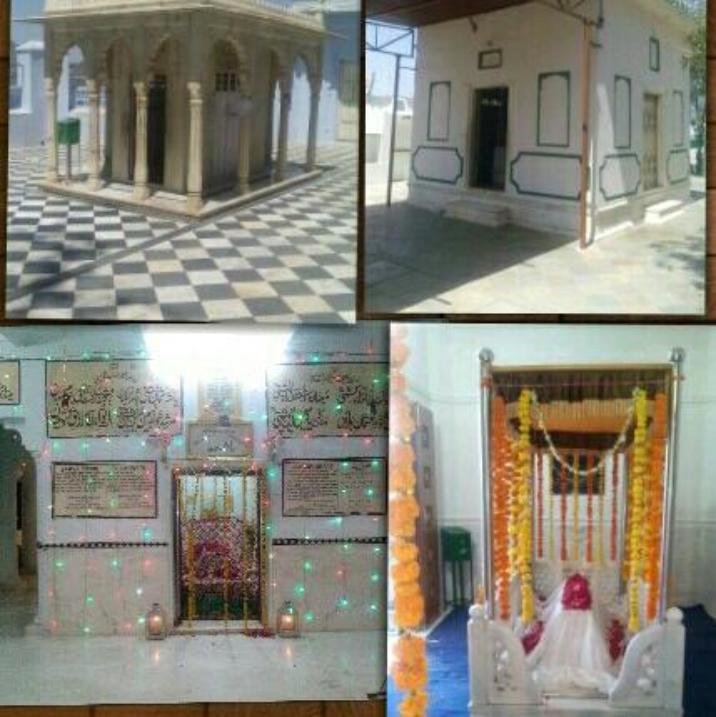
Above: the four shrines of the Gudri Shahi Order: taken at Urs 2017 by
Maryam Moghadam.
1. Saeenji Saheb 2. Qazi Saheb, 3, Nawob Saheb 4. Zahurmian
Maryam Moghadam.
1. Saeenji Saheb 2. Qazi Saheb, 3, Nawob Saheb 4. Zahurmian
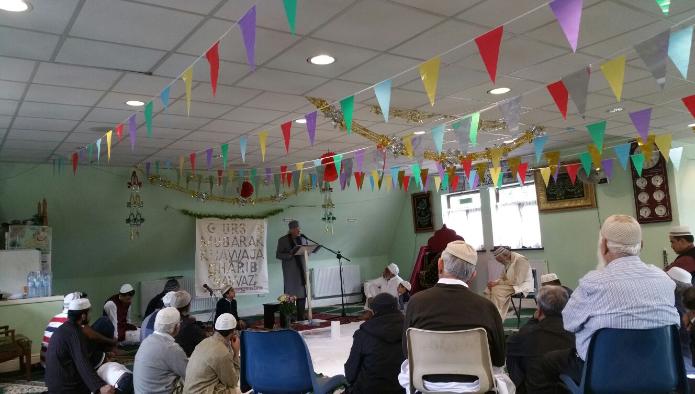
pictures from 'Urs 2017 from Southampton; from the Razvia Mosque courtesy of Asif

Ali and Adam cleaning the entrance to Mosque
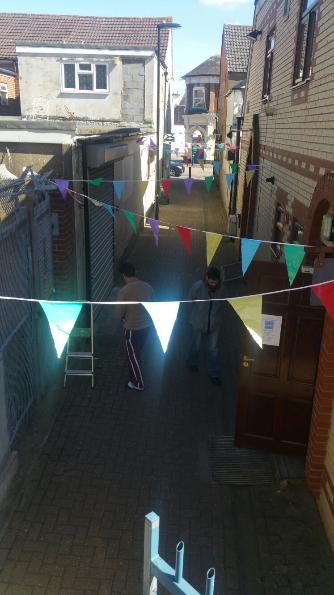
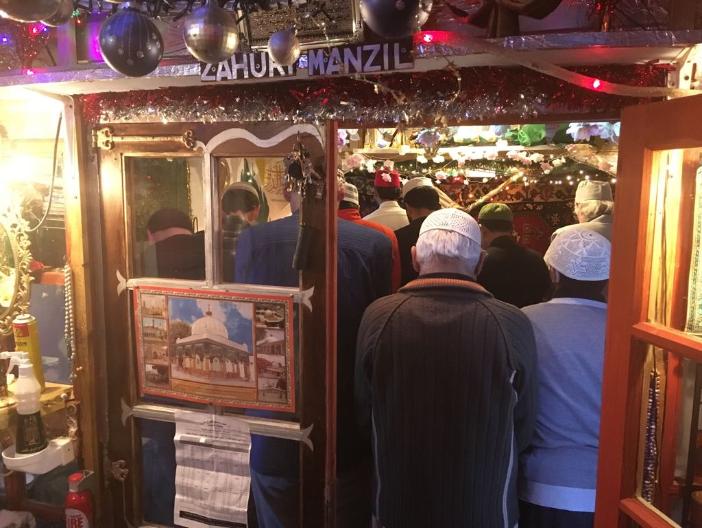
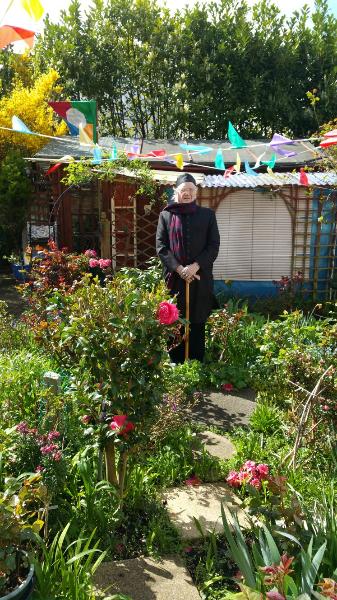
| Namaz at Zahuri Manzil during urs 17 by Asif |
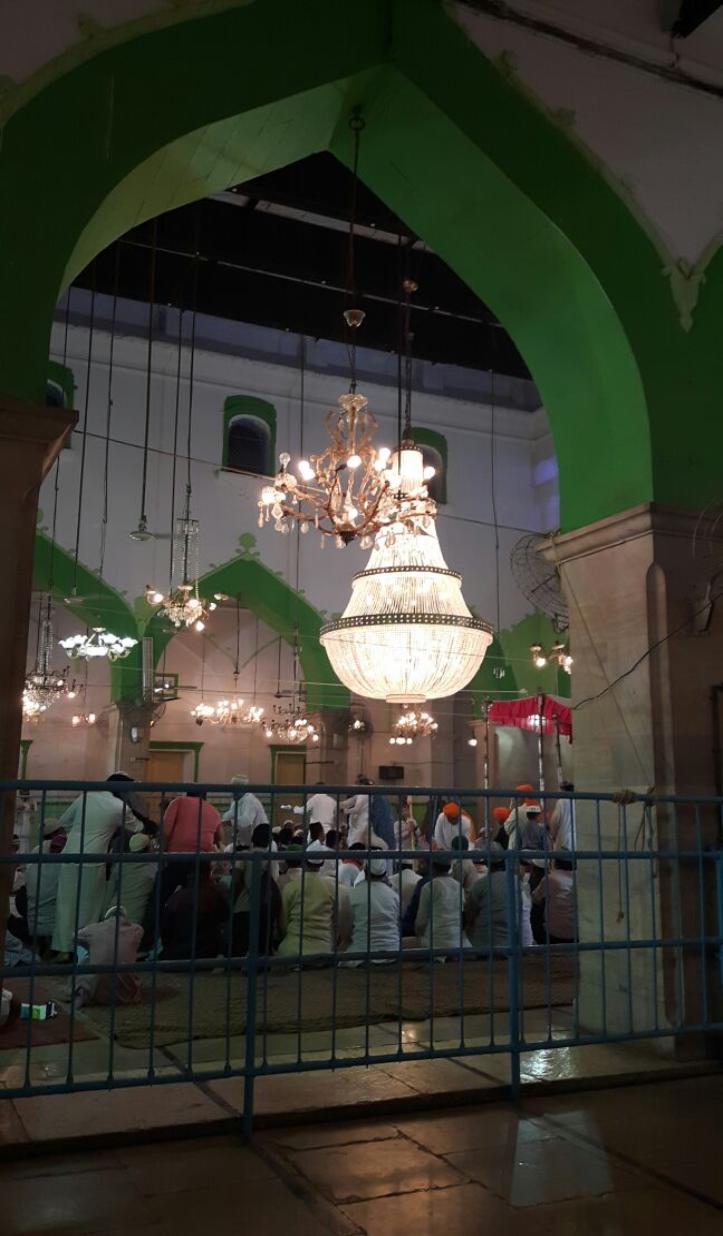
| Mehfil Khana - the auditorium adjacent to the shrine of Khwaja Saheb used for the music concert of the Sufis 2017. photo courtesy of Maryam Moghadam |
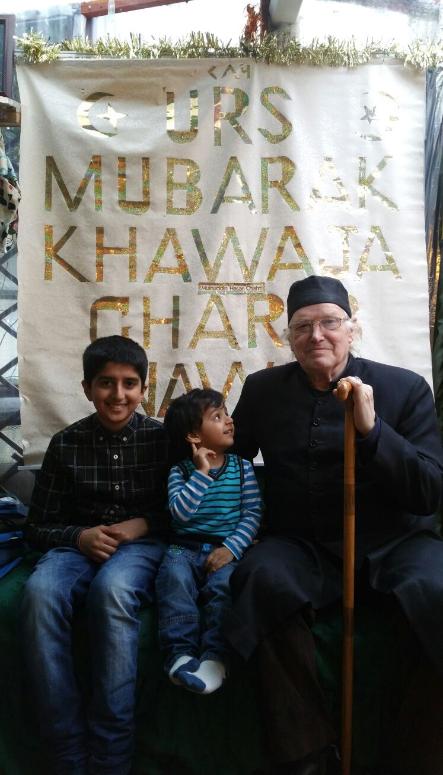
Jamil with Hussain and Aliyan at Zahuri Manzil
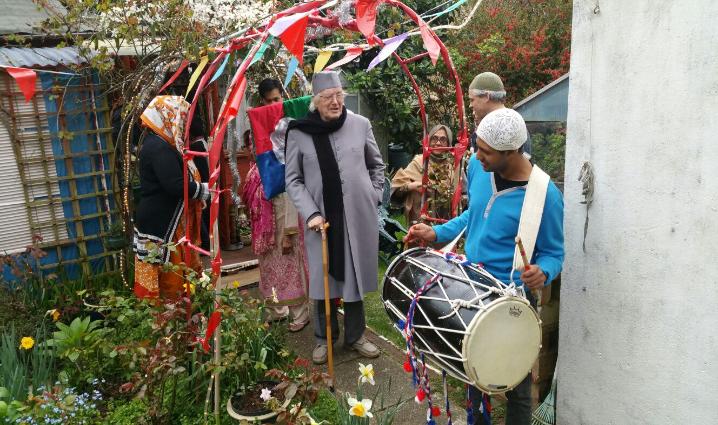
flag ceremony Southampton with Farhan on drum
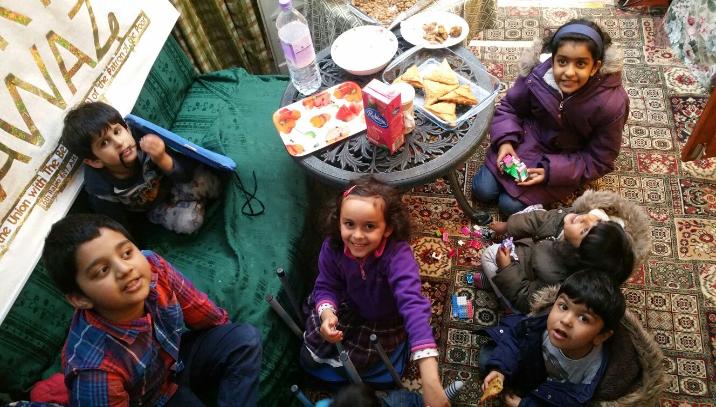
Children at Urs in Southampton


Flag Ceremony in Ajmer courtesy M Moghadam
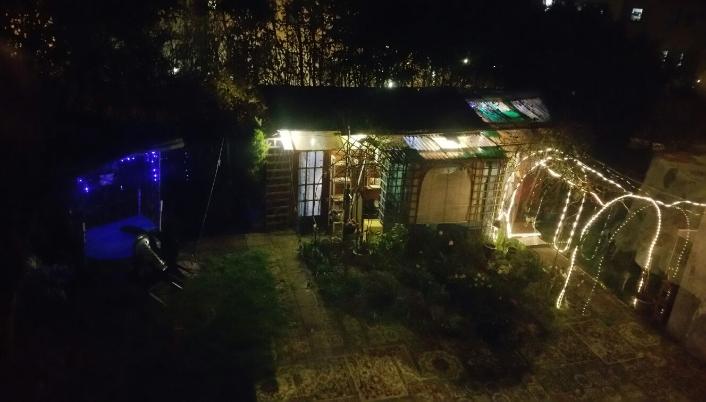
'Urs 17. Zahuri Manzil, Southampton, at night
The Poetry Symposium in Southampton was held this year at "Better Living." This is a new venture started by
Riaz Sharif. It is a studio space in Shirley, rented out to various community groups. The sound quality there is
excellent for poetry reading. it is hoped in the future various other Sufi events will be held there. "Better Living"
is an expression coined by Zahurmian many years ago to describe the aspiration of modern Sufi thought.
Riaz Sharif. It is a studio space in Shirley, rented out to various community groups. The sound quality there is
excellent for poetry reading. it is hoped in the future various other Sufi events will be held there. "Better Living"
is an expression coined by Zahurmian many years ago to describe the aspiration of modern Sufi thought.